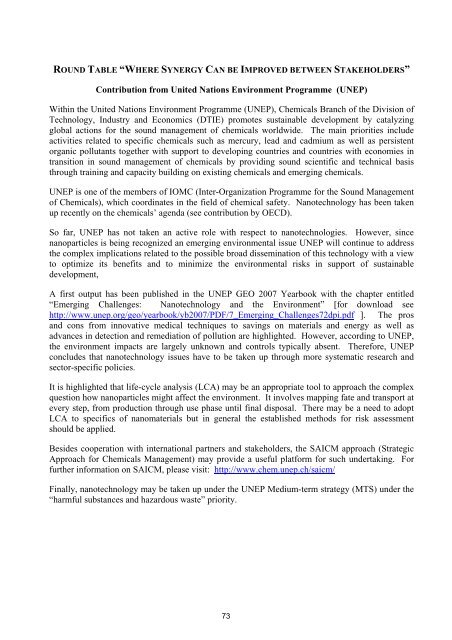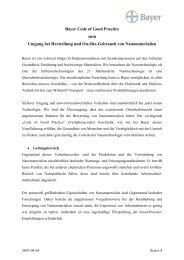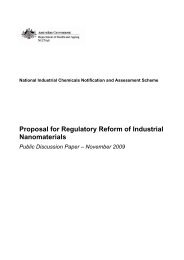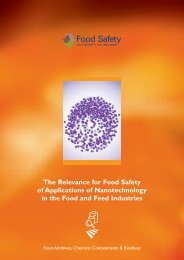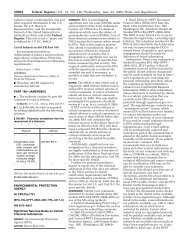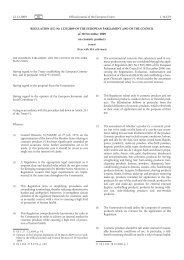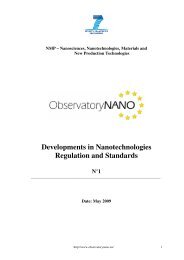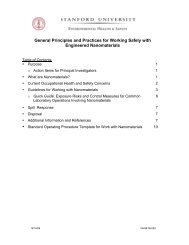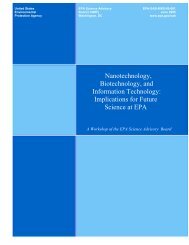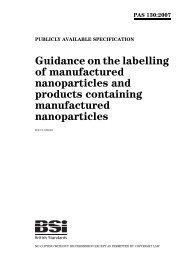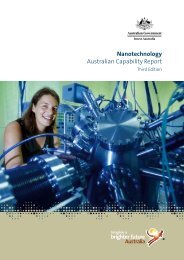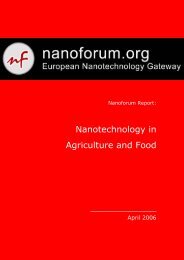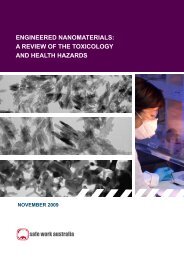Nanotechnology - Nanotech Regulatory Document Archive - Arizona ...
Nanotechnology - Nanotech Regulatory Document Archive - Arizona ...
Nanotechnology - Nanotech Regulatory Document Archive - Arizona ...
You also want an ePaper? Increase the reach of your titles
YUMPU automatically turns print PDFs into web optimized ePapers that Google loves.
ROUND TABLE “WHERE SYNERGY CAN BE IMPROVED BETWEEN STAKEHOLDERS”<br />
Contribution from United Nations Environment Programme (UNEP)<br />
Within the United Nations Environment Programme (UNEP), Chemicals Branch of the Division of<br />
Technology, Industry and Economics (DTIE) promotes sustainable development by catalyzing<br />
global actions for the sound management of chemicals worldwide. The main priorities include<br />
activities related to specific chemicals such as mercury, lead and cadmium as well as persistent<br />
organic pollutants together with support to developing countries and countries with economies in<br />
transition in sound management of chemicals by providing sound scientific and technical basis<br />
through training and capacity building on existing chemicals and emerging chemicals.<br />
UNEP is one of the members of IOMC (Inter-Organization Programme for the Sound Management<br />
of Chemicals), which coordinates in the field of chemical safety. <strong><strong>Nanotech</strong>nology</strong> has been taken<br />
up recently on the chemicals’ agenda (see contribution by OECD).<br />
So far, UNEP has not taken an active role with respect to nanotechnologies. However, since<br />
nanoparticles is being recognized an emerging environmental issue UNEP will continue to address<br />
the complex implications related to the possible broad dissemination of this technology with a view<br />
to optimize its benefits and to minimize the environmental risks in support of sustainable<br />
development,<br />
A first output has been published in the UNEP GEO 2007 Yearbook with the chapter entitled<br />
“Emerging Challenges: <strong><strong>Nanotech</strong>nology</strong> and the Environment” [for download see<br />
http://www.unep.org/geo/yearbook/yb2007/PDF/7_Emerging_Challenges72dpi.pdf ]. The pros<br />
and cons from innovative medical techniques to savings on materials and energy as well as<br />
advances in detection and remediation of pollution are highlighted. However, according to UNEP,<br />
the environment impacts are largely unknown and controls typically absent. Therefore, UNEP<br />
concludes that nanotechnology issues have to be taken up through more systematic research and<br />
sector-specific policies.<br />
It is highlighted that life-cycle analysis (LCA) may be an appropriate tool to approach the complex<br />
question how nanoparticles might affect the environment. It involves mapping fate and transport at<br />
every step, from production through use phase until final disposal. There may be a need to adopt<br />
LCA to specifics of nanomaterials but in general the established methods for risk assessment<br />
should be applied.<br />
Besides cooperation with international partners and stakeholders, the SAICM approach (Strategic<br />
Approach for Chemicals Management) may provide a useful platform for such undertaking. For<br />
further information on SAICM, please visit: http://www.chem.unep.ch/saicm/<br />
Finally, nanotechnology may be taken up under the UNEP Medium-term strategy (MTS) under the<br />
“harmful substances and hazardous waste” priority.<br />
73


